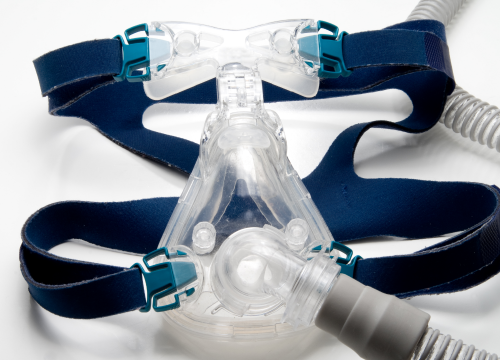Difference Between CPAP and BIPAP
CPAP is a common method of delivering air to patients with sleep apnea. CPAP or continuous positive airway pressure is a technique in which a machine generates a constant pressure of air to the person wearing the device. This pressure is set by a healthcare provider and cannot be altered by anyone else. BiPAP or Bi-level Positive Airway Pressure is a method of respiratory support in which there are two different constant pressure level settings for inhalation and exhalation.

What is CPAP?
Definition:
CPAP is a common method of delivering air to patients with sleep apnea. CPAP or continuous positive airway pressure is a technique in which a machine generates a constant pressure of air to the person wearing the device. This pressure is set by a healthcare provider and cannot be altered by anyone else.
Uses:
CPAP is used to treat patients with simple forms of obstructive sleep apnea and central apnea.
Portability:
CPAP has an advantage over BiPAP that it comes in portable machines.
Air pressure:
CPAP maintains a pressure as high as only 20cm of H20.
Cost:
CPAP devices are cheap and portable.
Ease to Use:
CPAP machine is easy to deal with even for people who are not so sound technically.
Availability:
CPAP is easily available.

What is BiPAP?
Definition:
BiPAP or Bi-level Positive Airway Pressure is a method of respiratory support in which there are two different constant pressure level settings for inhalation and exhalation.
Uses:
BiPAP works best in conditions like complex sleep apnea, obesity-hypoventilation syndrome, and in patients who have chronic obstructive pulmonary disease and sleep apnea combined.
Portability:
BiPAP is not travel-friendly.
Air pressure:
BiPAP machines feature air pressures that have a diversity of going as high as 25cm of H2O.
Cost:
BiPAP is costly and goes as high as up to twice or four times the price of a CPAP machine.
Ease to use:
BiPAP machines are complex and are hard to configure.
Availability:
BiPAP machines are hard to find.
Difference Between CPAP and BIPAP
Definition:
CPAP is a common method of delivering air to patients with sleep apnea. CPAP or continuous positive airway pressure is a technique in which a machine generates a constant pressure of air to the person wearing the device. This pressure is set by a healthcare provider and cannot be altered by anyone else. BiPAP or Bi-level Positive Airway Pressure is a method of respiratory support in which there are two different constant pressure level settings for inhalation and exhalation.
Uses:
CPAP is used to treat patients with simple forms of obstructive sleep apnea and central apnea.
BiPAP works best in conditions like complex sleep apnea, obesity-hypoventilation syndrome, and in patients who have chronic obstructive pulmonary disease and sleep apnea combined.
Portability:
CPAP has an advantage over BiPAP that it comes in portable machines.
BiPAP is not travel-friendly.
Air pressure:
BiPAP machines feature air pressures that have a diversity of going as high as 25cm of H2O.
CPAP maintains a pressure as high as only 20cm of H20.
Cost:
CPAP devices are cheap and portable.
BiPAP is costly and goes as high as up to twice or four times the price of a CPAP machine.
Easy to Use:
CPAP machine is easy to deal with even for people who are not so sound technically. BiPAP machines are complex and are hard to configure.
Availability:
CPAP is easily available. BiPAP machines are hard to find.
Table of differences Between CPAP and BIPAP

FAQs:
Why would you use BiPAP instead of CPAP?
CPAP is used to treat patients with simple forms of obstructive sleep apnea and central apnea.
BiPAP works best in conditions like complex sleep apnea, obesity-hypoventilation syndrome, and in patients who have chronic obstructive pulmonary disease and sleep apnea combined.
When should I choose a BiPAP or CPAP?
Choosing between a BiPAP and CPAP depends on the severity and type of the health condition of the patient. In obstructive sleep apnea CPAP is the first line choice whereas in complex sleep apnea, BiPAP is preferred.
Is a CPAP machine or BiPAP better for sleep apnea?
A CPAP is better for obstructive sleep apnea.
What is the disadvantage of BiPAP?
BiPAP machines are very costly. They are not travel-friendly and are also not easily accessible.
What are the disadvantages of BiPAP over CPAP?
BiPAP machines have complex settings. They make a lot of noise while being used. These machines are costly, not portable, and hard to find.
Which is more severe BiPAP or CPAP?
None of the machines are severe but they are needed depending on the severity of the health condition of the patient. Where CPAP is best for obstructive and central sleep apnea, BiPAP is best for complex sleep apnea.
- Differences Between Reptiles and Amphibians - May 17, 2024
- Difference Between Ophthalmology and Optometry - May 15, 2024
- Difference Between Fear and Anxiety - April 2, 2024
Search DifferenceBetween.net :
1 Comment
Leave a Response
References :
[0]Engleman, Heather M., and Matt R. Wild. "Improving CPAP use by patients with the sleep apnoea/hypopnoea syndrome (SAHS)." Sleep medicine reviews 7.1 (2003): 81-99.
[1]McEvoy, R. Doug, et al. "CPAP for prevention of cardiovascular events in obstructive sleep apnea." New England Journal of Medicine 375.10 (2016): 919-931.
[2]Kleopa, Kleopas A., et al. "Bipap improves survival and rate of pulmonary function decline in patients with ALS." Journal of the neurological sciences 164.1 (1999): 82-88.
[3]Image credit: https://www.canva.com/photos/MAEeA92UjrA-bilevel-positive-airway-pressure-on-a-hospital-bed/
[4]Image credit: https://www.canva.com/photos/MAEyYBS6jxc-cpap-mask/

So I have a CPAP machine and have COPD. Should I be on a Bipap